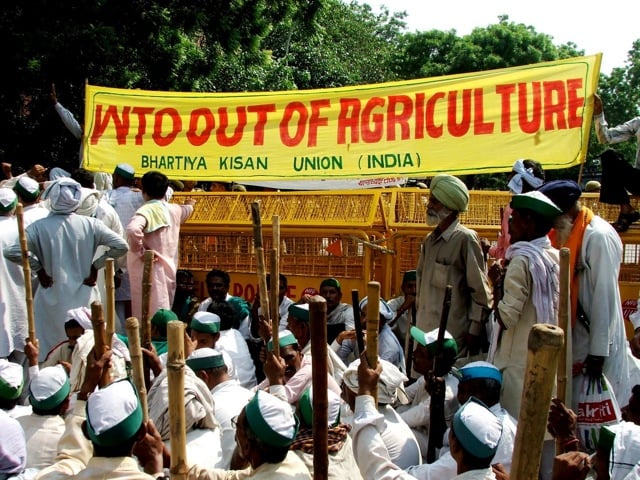Why Indian Farmers Protest Against WTO?
Farmers in India continue to protest against the World Trade Organization (WTO) policies, arguing that these regulations undermine their livelihoods. The protests, particularly strong in Punjab, have expanded beyond the demand for legalising Minimum Support Prices (MSP) to a call for India to withdraw from the WTO. Farmers claim that WTO rules disproportionately benefit developed countries, threatening food security and smallholder incomes in India.
Farmers’ Demands
Farmers are demanding the withdrawal of India from the WTO. They seek legal guarantees for Minimum Support Prices (MSP) for all crops. Their protests highlight the perceived bias of WTO rules against developing nations.
Impact on Food Security
WTO regulations restrict agricultural subsidies and public procurement, jeopardising India’s food security. The public distribution system, crucial for affordable food, is threatened by these policies.
Minimum Support Price (MSP)
The MSP is capped at 10% of production value, failing to adjust for inflation. Farmers argue that this limits their income and makes them vulnerable to market fluctuations.
WTO’s Agreement on Agriculture (AoA)
The AoA aims to reduce agricultural subsidies globally but is seen as favouring developed countries. Critics argue it restricts India’s domestic support programmes.
About WTO
- The WTO has 164 member countries and aims to facilitate international trade.
- It operates through a Ministerial Conference and a General Council.
- It addresses trade in goods, services, and intellectual property rights, but struggles with consensus among diverse members.
- WTO rules are often viewed as skewed towards wealthier nations, leading to calls for reform.
Concerns for Small Farmers
Small farmers, who make up 86% of India’s agricultural population, face challenges due to lack of access to technology and markets. Liberalised trade exposes them to unfair competition.
India’s Position
India seeks a permanent solution for public stockholding and opposes non-trade issues in WTO discussions. It demands greater protection for geographical indications for its agricultural products.
Future of WTO
The WTO faces criticism for its effectiveness and transparency. Reform discussions are ongoing, with suggestions for plurilateral agreements among like-minded countries to address emerging trade issues.
Month: Current Affairs - January, 2025
Category: Agriculture Current Affairs








